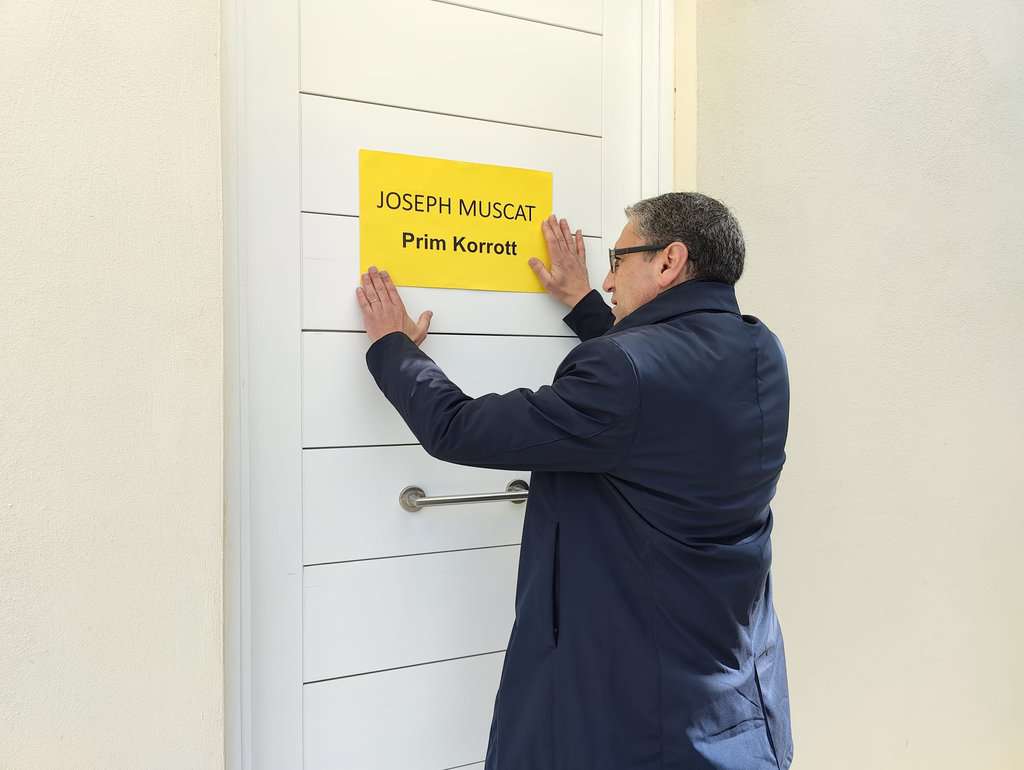
Joseph Muscat was irritated by Robert Aquilina’s visit to his state-provided office this morning. Nobody likes to be told their proper place is serving time. But if Robert Aquilina said Pope Francis’s place was in prison, the absurdity of the notion would be such that Pope Francis would ignore it. Replace Pope Francis with anyone obviously undeserving of prison. You can’t replace him with Joseph Muscat.
Of course, “it’s obvious” does not a successful prosecution make. Even so, compare the plausibility of the Joseph-Muscat-should-be-in-prison notion with the alternative premise provided by the disgraced former prime minister in his response. “I welcome any scrutiny,” said Joseph Muscat in his standard reply to scrutiny he does not welcome, “because any deep look into my conduct as prime minister will find I always acted in the national interest.”
Now that is a big ask, isn’t it? Because the benchmark ‘I acted in the national interest’ is far higher than the ordinary ‘I committed no crime’. There has been more than enough scrutiny to determine that Joseph Muscat’s claim that he acted in the national interest is utter rubbish.
Consider the present debate on the hospitals’ privatisation. Except for the receptionist at the Gozo hospital nobody has claimed their life improved in any way as a result of Joseph Muscat’s policy to hive off three public hospitals. Arguably, there’s a chance that if Gozo General remained in public ownership, the receptionist’s toilet would have been improved anyway. No patient, no doctor, no hospital staffer, no tax-payer, nobody has come out to say they were better off after privatisation or during it.
The national interest was not served in anyway.
But let us also consider the possibility that Joseph Muscat set out to act in the national interest and through no fault of his own, failed.
Now we need to resort to the scrutiny that has already happened. The Auditor General scrutinised the privatisation and found fundamental failures in the contracting of the deal, particularly the fact that the government signed a contract with the people who were given the hospitals before the competitive tender for the concession they eventually won was even published.
That definitely wasn’t in the national interest.
And then there’s the scrutiny conducted by the court in the case brought by Adrian Delia. The court found negligence, irresponsible superficiality, amateurism, and naivete, and these were best case scenarios when describing the government’s actions.
Is any of that – negligence, superficiality, amateurism, naivete – a way of describing a government’s actions in the national interest? Do I have to answer that?
No, Robert Aquilina and Repubblika are not being jury, judge, and executioners when we say Joseph Muscat’s mail should be forwarded to prison. We’d be that if we broke down that door and took the law in our own hands. Protesting to urge institutions to uphold the law is not the same as taking the law into your own hands. It is the opposite of that. It is the most lawful action imaginable in a democracy because more than exercising a right, protesters are demanding that people in institutions fulfil their duties.
We’re doing the opposite of being jury, judge, and executioner. We’re reminding the authorities of their sole and exclusive responsibility to bring Joseph Muscat in front of a jury or a judge and to do so because of the evidence which is and has been in the public domain. Let’s ignore the reference to executioners because that notion is not even worthy of comment. Maybe we can switch that with a prison director who remembers the mess of last week before he authorises his most offensive inmates to go to family gatherings.
Incidentally, that’s a thought that occurred to me when I saw that photo Joseph and Michelle Muscat took at Ta’ Betta Winery lying to their Insta followers that they were invited there, pretending that a box of wine they bought was a gift like pathetically struggling socialites, and sporting branded accessories that scream laundered proceeds of crime like a gold chain around the neck of a low-ranking Mexican gangster.

They did that in an attempt to embarrass the owners of the winery which if nothing else proves one thing: Joe & Mish realise they are so toxic that it is enough to damage someone’s reputation to suggest that someone has tolerated their company. In other words, they’ve become the blackmailing rent boys who testified against Oscar Wilde.
Their stupid grin in that photo looked so much like the mocking smiles of George Degiorgio and his relatives on his afternoon off from a 40-year sentence.

Those bare teeth, whether through the thin lips of Muscat or the fat ones of Degiorgio, betray the same bitterness that people who lived for decades believing themselves invincible and above consequence now find themselves running out of opportunities to spite the world.
Joseph Muscat bluffs with a two of spades and a nine of diamonds in his hand, telling us that from his point of view his cards say that he has always acted in the national interest. Perhaps he might sell that idea to his cell-mates while they exchange stories of how they got their tattoos.
Now here’s a mental picture you won’t get rid of easily: Joseph Muscat foaming under the prison shower, translating Invictus from Latin to jive.